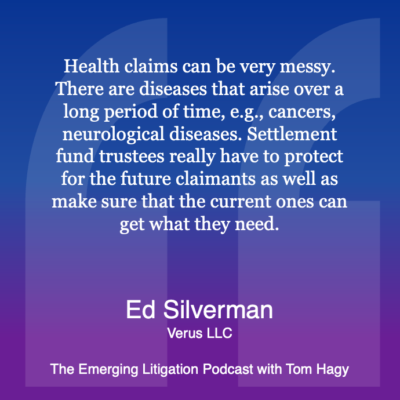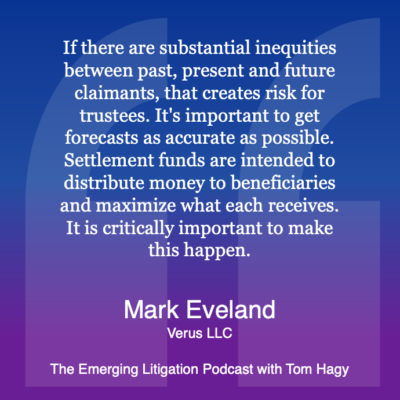Massive Mass Tort Settlements and Liability Forecasting
Concepts: Mass Tort Litigation, Mass Tort Settlements, Liability Forecasting
Today we talk about liability forecasting and the role it plays in the administration of massive, sometimes multi-billion-dollar mass tort settlement trusts. These mechanisms were built to fairly and judiciously compensate current and future claimants for their injuries.
Mass tort litigation is a complicated beast as is the administration of these trusts.
- Exposures, injuries, and the discovery of injuries can occur over decades. In the meantime, companies come and go. They are are bought and sold. They declare bankruptcy.
- People are exposed to new elements or conditions in the environment and the workplace.
- On the financial side, market fluctuations and interest rates impact the value of the funds.
- On the medical side, advancements in diagnostics can affect the number of claimants and the timing of their claims.
- New technologies can be a factor, too, like the ability to create deep-fake evidence or even claimants.
- Then there are the unpredictable events. The Covid-19 pandemic offered another confounding factor when many Americans suddenly had virus-related respiratory issues, perhaps joining injuries they may have suffered, or were quietly developing, from a toxic exposure.
In other words, there are many overlapping, interlocking, intersecting, and dynamic layers involved with people, companies, diseases, certain financial externalities, and "black swans" that complicate the oversight of settlement funds.
Listen to my conversation with Mark Eveland and Ed Silverman, both with Verus LLC, which provides litigation support services to law firms working on mass torts, such as case management and medical review services, settlement administration, business and advisory services, and analytics. They explain that liability forecasting is a practice best understood through the three areas it analyzes: (i) the risks and injuries created by a product and its use, (ii) claims filed and approved, and (iii) finances. Liability forecasting is both a science and an art, they say, with plenty of risks.
Eveland, founder, CSO, and chairman of the board, is an expert in building settlement and claims management programs for mass torts, class actions, and insurance runoffs. Throughout his career, Mark has provided research, discovery, analytics, settlement administration, and expert witness support litigators around the country.
Trained in molecular biology, genetics and epigenetics, and biochemistry, Silverman is an analytics executive, a life science expert, and biomedical communications specialist. Ed assists with data analytics, scientific collaboration networks, patient based medical claims, and more.
I hope you enjoy the episode. If so, give us a rating!
Bonus: I left in a little introductory jazz in the beginning, then encouraged Ed to discuss his background and research, which I was thrilled to find included how fruit flies (Drosophila melanogaster) form memories. I can't tell you how glad I was I asked. Yes I can. Very glad.

If you have comments, ideas, or wish to participate, please drop me a note at Editor@LitigationConferences.com.
Tom Hagy
Litigation Enthusiast and
Host of the Emerging Litigation Podcast
Home Page
LinkedIn
Tags



